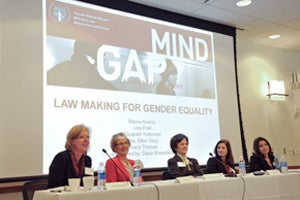On February 3, the Harvard Women’s Law Association held its 6th annual conference. This year’s conference, entitled “Mind the Gap: Achieving Actual Parity,” was an open forum about achieving equality in the courtroom, workplace, and community. The conference featured panel discussions designed to highlight four critical equality gaps for women and girls—maternal health worldwide, lawmaking for gender equality, women in leadership, and litigating to fight discrimination—and to discuss how these challenges can best be addressed using legal and other skills. Kamala Harris, Attorney General of California, delivered the keynote address.
In introducing Harris, Harvard Law School Dean and Jeremiah Smith, Jr. Professor of Law Martha Minow discussed the significance of the conference’s title. The word “mind” tells us to pay attention, she said, and the conference speakers had certainly done just that.
“The speakers today have helped us to be bothered and troubled,” said Minow. “As Ann Landers used to say, ‘Expect trouble as an inevitable part of life and, when it comes, hold your head high, look it squarely in the eye and say ‘I will be bigger then you. You cannot defeat me.’  Kamala Harris is someone who has faced trouble, made trouble and made a huge difference for women and as an outstanding leader.”
Kamala Harris is someone who has faced trouble, made trouble and made a huge difference for women and as an outstanding leader.”
In her remarks, Harris (left) touched upon her background, the politics of running for office as a woman and the work she has done as District Attorney of San Francisco and is currently doing as California Attorney General. Her parents were both academics who were active in the civil rights movement, and it was her early exposure to that activism that inspired her to become a lawyer.
“My heroes were the architects of the civil rights movement,” she said. “Those architects were the lawyers doing the important work of translating the passion from the streets to the courtrooms, and reminding folks of the great promise we articulated in 1776, which is that we are all and should be treated equal.”
She chose to become a prosecutor for the potential to have a direct impact on the most vulnerable. Although her family was skeptical of the ability of a prosecutor to provide equality, she remained determined that that in the process of providing safety, it is also the job of law enforcement to provide dignity.
From the Alameda County District Attorney’s Office, Harris was elected District Attorney of San Francisco in 2003. As District Attorney, and like many district attorneys in cities across the country, she made crime prevention a priority. But unlike any of her peers, she addressed the issue by focusing on elementary school truancy and prosecuting parents of truant students. Although the focus seemed puzzling to many, Harris acted upon local data that showed that 94 percent of homicide victims under 25 were high school dropouts, and 40 percent of chronically truant students were in elementary school. She explained that her decision to prosecute parents for truancy followed naturally from the premise that denying a child an education is tantamount to a crime.
She sent a letter to every parent in the school district, outlining the direct connection between elementary school truancy and high school dropout rates, and becoming victims and perpetrators of crime. Although the plan initially made her unpopular with parents and even some teachers and administrators, Harris succeeded in improving attendance by 30 percent. The experience underscored the importance of refusing to accept false choices.
“Part of breaking barriers is about innovation. It’s about understanding that there is some new idea that can be applied in a way that will improve efficiency. We can’t be blindly adherent to tradition,” Harris said.
In 2010, she was elected California Attorney General, and is the first female, African-American, and Asian to hold the office in California. In closing her remarks, Harris imparted upon the audience advice that her mother had given her – you may be the first to do something, but make sure that you’re not the last.
“My mother’s words mean that you are the future and legacy of many, but it also means that you should own your power at every stage of your life. You don’t need a law degree or to hold the office of Attorney General. It starts now.”
